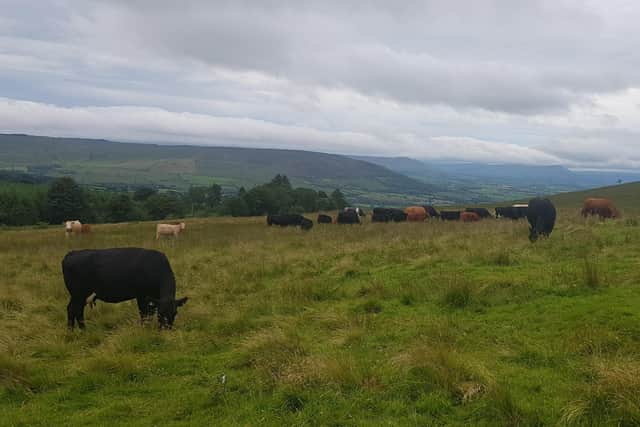Livestock farming is part of the climate solution and food security
and live on Freeview channel 276
Some think we as farmers are just full of doom and gloom.
This is very much far from the truth. We are up for the debate and there is a future in agriculture and livestock farming in Northern Ireland (NI). We could even be global leaders. Surely this could be something we can all get behind.
Food production is critical for any country’s security and the UK today is only approximately 64 percent self-sufficient. Until now, imports have easily made up for any shortfall. But as Brexit and climate change threaten the norm, experts are warning that greater self-sufficiency will be crucial. Food security isn’t the only argument behind greater self-sufficiency. It could also have benefits for the economy and food poverty, and this just makes sense.


Advertisement
Advertisement
In 1990 the UK population was 57.25 million and today is about 66.22 million. The global population in 1990 was about 5.3 billion and today is 7.9 billion and growing about 81 million per year. There is no more land, only farmers and growers can provide the necessary produce to feed a growing population, so should they not be treated with a little more respect than what they are getting now?
Policy makers and politicians must recognise the importance of food security and the impact of producing food in relation to climate change. Under 2.1 (b) of the Paris agreement it states, “Increasing the ability to adapt to the adverse impacts of climate change and foster climate resilience and low greenhouse gas emissions development, in a manner that does not threaten food production.” Therefore, it makes no sense to tackle climate issues in NI with emission reductions by culling particularly ruminant livestock. NI can play a huge role in addressing climate issues and farmers are very much up for this challenge. There needs to be mitigation measures introduced to keep global temperatures to below 1.5 degrees.
At the Irish Farmers Journal NI Climate Change Summit earlier this week, Professor Myles Allen from the University of Oxford highlighted the need to consider the impact of methane on global warming and how the current accounting system for greenhouse gases unfairly targets agriculture. For some time, agricultural organisations from across Europe, UK and New Zealand (including the UFU), have been calling for the Intergovernmental Panel on Climate Change (IPCC) to consider short lived pollutants such as methane and recognise this aspect within the international inventory. The UFU also made it clear to the AERA Committee during the climate change bill scrutiny process, that they needed to take advice from Professor Allen and other experts on how methane should be treated. The UFU considers it vitally important that the best scientific information and tools available are being used to inform and build trust in the decisions they are taking. However, it is clear that some of our politicians are failing to listen to that expert advice and science when they choose to back targets that they have been warned against by several experts.
We cannot afford to increase our methane as it is linked to global warming but if we in NI have to reduce our ruminant numbers, it will see us importing products from around the globe. What will we really have achieved for reducing global temperatures if we were to do this?
Advertisement
Advertisement
A livestock farmer who perhaps reduces herd size or uses a feed additive to reduce methane emissions is not rewarded in the same was as say, a farmer who plants trees to remove CO2 from the atmosphere. It would have the same cooling effect, but it would be treated very differently by the current greenhouse gas accounting system.
The next 10 days for agriculture in NI are critical given that the Executive’s Climate Change Bill is fast approaching the deadline for amendments to be made at the NI Assembly. This now leaves agriculture in an extremely vulnerable situation and unless there are realistic amendments brought forward, farming is in jeopardy. Our MLAs need to grasp this issue very seriously and find a workable solution going forward to ensure that there is a future for agriculture and the wider rural NI economy. Our future is now in their hands, let’s hope they don’t make a mess of it.